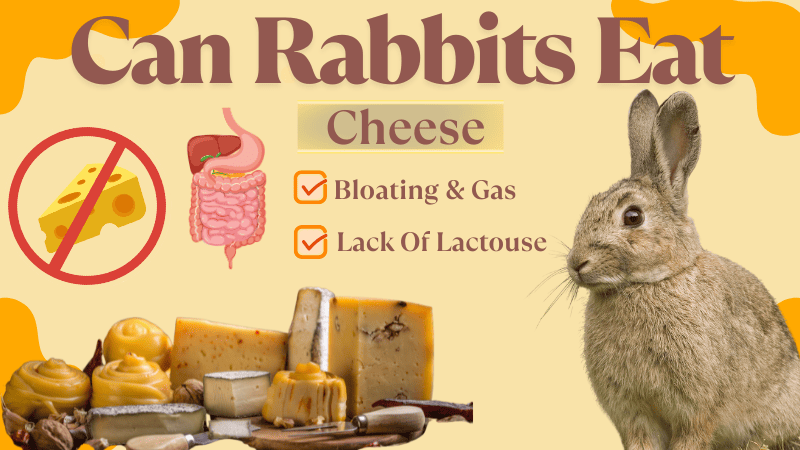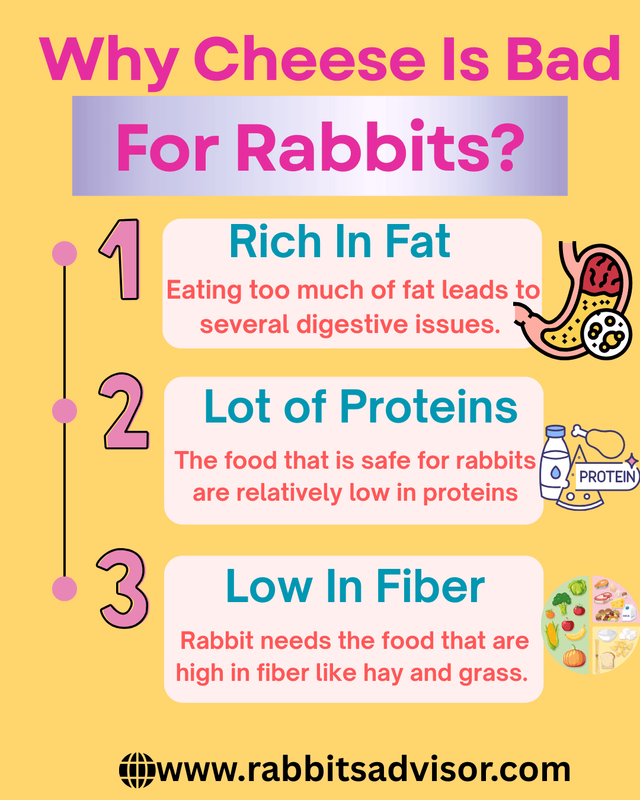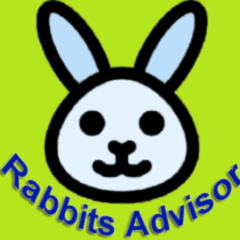Are you a rabbit owner? It is beautiful and a cute creature with soft fur and twitchy ears. Serving food is a daily routine but is always confused about the perfect diet. One common question that many of bunny lovers have is “Can Rabbits Eat Cheese?”
This is a simple question but answer to this is not as simple as you think. Let’s have a quick look to this altogether.

Here, you will receive all the necessary details about why cheese is bad for bunny?
Is Safe Cheese for Rabbit to Eat?
Cheese is a dairy product that mostly human enjoys during their meal. But is it safe for rabbit too. No, rabbits cannot eat the dairy products such as cheese, yogurt and milk. They have delicate systems which cannot digest these foods.
Also Read: Can Rabbits Eat Almonds (Butter + Raw)? Safe or Harmful
Serving cheese to your bunny can cause several health problems like stomach pain and bloating. It might even results to death.
It is better to serve the fresh vegetables and the hay while serving cheese to rabbit. These offer the essential nutrients that they don’t require.
Health Benefits of Cheese for Rabbits
Cheese can provide the benefits for bunnies when fed in moderation. It is great source of calcium necessary for strong bones and the teeth. Moreover, cheese also contains the phosphorous, which helps in bone and muscle health, proteins vital for the growth and the repair.
Calcium Supplementation
Rabbits need calcium for the optimal health. Green leafy veggies such as spinach and kale are a great source, so cheese can be fed as a supplementary source. Calcium helps to strengthen the bones and avoid the osteoporosis which is conditions that weakens the bones.
Cheese Nutritional Facts
Cheese is bad for bunnies, but healthy for humans. As the varieties of the cheese offer the different nutrients and the macros. So, here we will offer you a quick look to give you an idea about which nutritional requirements that rabbit don’t need.
Also Read: Can Rabbits Eat Pickles? A Guide for Pet Owners
| Cheese Type | Calories | Protein (g) | Fat (g) | Carbs (g) | Calcium (mg) | Sodium (mg) |
| Cheddar | 403 | 25 | 33 | 1.3 | 721 | 621 |
| Mozzarella | 280 | 28 | 17 | 3 | 505 | 37 |
| Parmesan | 431 | 38 | 29 | 4.1 | 1184 | 1529 |
| Swiss (Emmental) | 380 | 27 | 30 | 3 | 890 | 187 |
| Blue Cheese | 353 | 21 | 29 | 2.3 | 528 | 1300 |
| Feta | 264 | 14 | 21 | 4.1 | 493 | 917 |
| Brie | 334 | 21 | 29 | 0.5 | 184 | 629 |
| Cream Cheese | 342 | 6.2 | 34 | 4.1 | 98 | 321 |
| Cottage Cheese | 98 | 11 | 4.3 | 3.4 | 83 | 364 |
| Ricotta | 174 | 11 | 13 | 3 | 207 | 84 |
Why is Giving Cheese Bad for Your Rabbits?
Here are few reasons stating why cheese is bad for rabbits and you should avoid.

Cheese is Rich in Fat
Eating too much of fat leads to several digestive issues. Their delicate system is designed to munch o grass and other safe vegetation which are low in fat.
When rabbits consume the high fat content, then it results in the health issues like gas, bloating and indigestion. The bad bacteria that are present in the intestine serve on fats causes’ gas and other discomfort.
Lot of Proteins in Cheese
The food that is safe for rabbits are relatively low in proteins approx. (about 17% of the food). Cheese contains animal proteins that are in higher amount (about 25 %)
Also Read: Can Rabbits Eat Onions (Green, Spring, & Wild)? A Complete Guide
Cheese contains the wrong and large proteins and that are bad for rabbits.
This results in the problems for rabbit’s gut health if it tries to eat those proteins. It is mixed with amino acids which is the building block of the proteins and is present in large quantity.
But, Too Low Fibre
Rabbit consumes the food that is rich in fiber like hay and grass. Their body and digestive system are designed to digest these foods and break down the fiber. As it helps the gut to function properly which do not block up and leads to constipation?
Cheese contains no amount of fiber. If rabbit overeats the cheese can affect their gut health. It can start blocking up which results in constipation.
Constipated human is uncomfortable
Constipation in the rabbits can even lead to death. They have delicate sensitive digestive system which may lead to GI Stasis which is a serious problem for your bunny.
Quickly call to your personal vet if you observe that your rabbit has GI Stasis.
Symptoms of Adverse Reaction to Eating Cheese
Monitor the reactions carefully if your furry friend has consumed cheese:
Also Read: Do Rabbits Eat Insects? What Science Says
- Behavioral change like lethargy or lower the activity levels.
- Reduce the consumption of water and change in appetite.
- Signs of discomfort like hunched posture, shaking or even teeth grinding.
- Changes in fecal output, like diarrhea or little, harder droppings
What Should You So if Rabbit Eat Cheese in Too Much?
If your bunny has ingested cheese or any other unsafe food, it is crucial to follow the guidelines:
Observe The Rabbit Carefully
Observe the rabbit if it shows any signs of discomfort or any problem in digestive system. It is necessary to contact a vet as soon as possible.
Remove The Offending Food
Availability of the cheese or any other unsafe foods that are still found near the rabbits prefers to avoid them for the further consumption.
Provide Appropriate Food and Water
Make sure that the rabbit eats adequate amount of fresh hay, vegetables and the fresh water to support their digestion.
Consult With An Veterinarian
If you notice any symptoms of digestive problems, it is better to contact a vet for the advice and the potential treatment.
How Do You Feed Cheese to Your Rabbit?
Always ensure to serve the cheese but in moderation. The following are some tips to keep in mind:
Introduce cheese in a small amount to rabbits like a tablespoon or teaspoon is enough and observe the reactions.
Also Read: Do Rabbits Eat Mums or Not? Let’s Find Out
Do not offer in the large piece; instead choose a small so that they can easily digest it.
Cheese should be considering as a special treat rather than the primary source in their diet. Ensure that they get the proper balanced diet that consists of hay, green leafy veggies and pellets.
Notice the rabbit’s reaction just after feeding cheese to bunnies. If they show any signs of discomfort or any other health problems, stop serving cheese immediately.
Healthy Treat Alternatives to Cheese for Rabbits:
Here are some safe, rabbit-approved treats that mimic the fun of giving a “treat” like cheese, but without the health risks:
Veggies (Fresh and Leafy)
- Romaine lettuce
- Basil
- Cilantro
- Mint
- Dill
Parsley (in moderation)
- Root Veggies (Occasional Treats)
- Carrots (high in sugar — use sparingly!)
- Radish tops (great alternative!)
- Beet greens
Fruits (Tiny Pieces, as Treats Only)
- Apple (no seeds)
- Strawberry
- Blueberry
- Banana
- Pear
FAQs (Frequently Asked Questions)
Can Rabbits Eat Cheese Crackers?
No, cracker cheese is bad for rabbits. They contain the dairy and are rich in carbohydrates and low in fiber which makes them unsuitable in rabbit’s diet.
Can Rabbits Have Cheese Puffs?
They are also known as cheese curls, balls, corn curls that are mostly covered with a mixture of cheese and other flavored powders. They contain the bad components that are relatively unhealthy for rabbits.
Can Rabbits Consume Cheese Nips?
They are little cheese crackers which has flavor in cheddar, low fat cheddar and other several variety of cheese. Even, those are not safe for rabbits as it contains the fat and sodium which is not good for bunny.
Is it okay to give a rabbit a small amount of dairy as a treat?
Even a little amount of the dairy products can cause several healthy issues like gastrointestinal upset.
Can Rabbits Eat All Types of Cheese Safely?
No, some cheese like blue cheese and moldy are bad and toxic for bunnies overall health.
How Often Can You Offer Rabbit Cheese?
It should be fed as a special treat, rather than a primary source in their diet.
Can Rabbits Eat Cheese Bread?
No, rabbits should not munch on cheese bread.
Both bread and cheese are bad foods for rabbits.
As cheese is a dairy product but it is not suitable for rabbits to consume as they are relatively low in fiber and results in digestive problems.
Bottom Lines: Can Rabbits Eat Cheese?
No Doubt! As the resulting of this post; cheese offers the many nutritional value, rich fat and lactose content that is an unhealthy treat for bunnies’ well-being. Make sure about their overall well being, it is best to minimize the consumption of cheese and provide a healthy food like hay, pellets and grass.
Also Read: Do Rabbits Eat Hydrangeas? A Full Guide to Pet Owners
Understand the risks and the benefits of the cheese that rabbit owners must know. As offering the balanced diet helps in making the rabbit healthy, happy and safe.
Do you have any experience, tips, tricks, or query regarding on this? You can drop a comment!
Have a Nice Day!!



